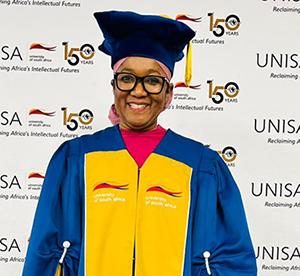
Dr Shahieda Jansen, Deputy Director: Academic & Information and Communication Technology (ICT) Support, undertook a community engagement project underscoring school belonging as a crucial factor in mitigating underperformance and its results in Western Cape communities. This project highlights Unisa’s steadfast commitment to enhancing societal well-being through research, while positively influencing lives in service to humanity.

Dr Shahieda Jansen
School underperformance and high dropout rates create a pool of vulnerable youth, who are more susceptible to involvement in crime. Addressing these educational gaps is crucial to break the cycle and build a safer, more prosperous future for the nation. This is the motivation behind Jansen’s community engagement project.
The project, titled Strengthening school belonging among urban high school boys in Cape Town, South Africa, focused on boys’ academic underperformance and other related problems relevant to boys such as aggression, violence, bullying and school dropout, among others. Jansen’s target was a sample of boys between 10 and 18 years of age at two pilot schools, one primary school (Southfield) and one high school (Salt River).
She explains that the academic underachievement of boys is a global concern. "When boys underperform academically, they are more likely to end up in the criminal justice system or in graveyards. With this project the university directly addresses a major local concern as well as a global problem."
Jansen adds that the desired outcome is to reveal data analysis that shows that school-belonging workshops have improved the sense of school belonging among participating boys, which, in turn, reflects on improved academic performance in accordance with school report results.
Jansen says that this project is registered as a community engagement (CE) project with the university, with an available budget. "It is also important," she continues, "to note that the school-belonging proposal received ethics clearance from Unisa’s research ethics committee. The relevant region (Unisa Western Cape) has also been supportive with venues, transportation, catering, administrative support, marketing and communications, and other resources."
With regard to potential partners within the community, Jansen comments that they are collaborating with the Cornerstone Institute, a non-profit higher education institute, who provided administrative support at some stages of the project. "There are other NGOs that have been identified that will be approached in due course," she adds.
"This is a pilot study, so it was deliberately kept small, as it also involves research," explains Jansen. "But in the future, males who are located inside institutions like schools and universities will be trained as part of a sustainability strategy for school belonging for boys. The goal is to create in-house school-belonging programmes for boys which will extend to school-belonging programmes for girls, teachers and many more."
In conclusion, Jansen states that the school-belonging project is informed by the indigenous notion of belonging, namely Umoya. In addition, she adds: "The approach to belonging is holistic and extends beyond religious/cultural affiliations. All of us, irrespective of religion, race, educational level or gender, depend on belonging for our thriving and surviving. Belonging is at the root of all human connections, whether to nature, the family, school, university or work."
Unisa's unwavering commitment to research positions it as a leader in innovation and knowledge creation. By empowering researchers and fostering a supportive environment, Unisa is not only shaping the future of the country’s communities, but also making a significant contribution to help transform communities into safer, crime-free and prosperous spaces.
* By Godfrey Madibane, Acting Journalist, Department of Institutional Advancement
Publish date: 2024-04-26 00:00:00.0